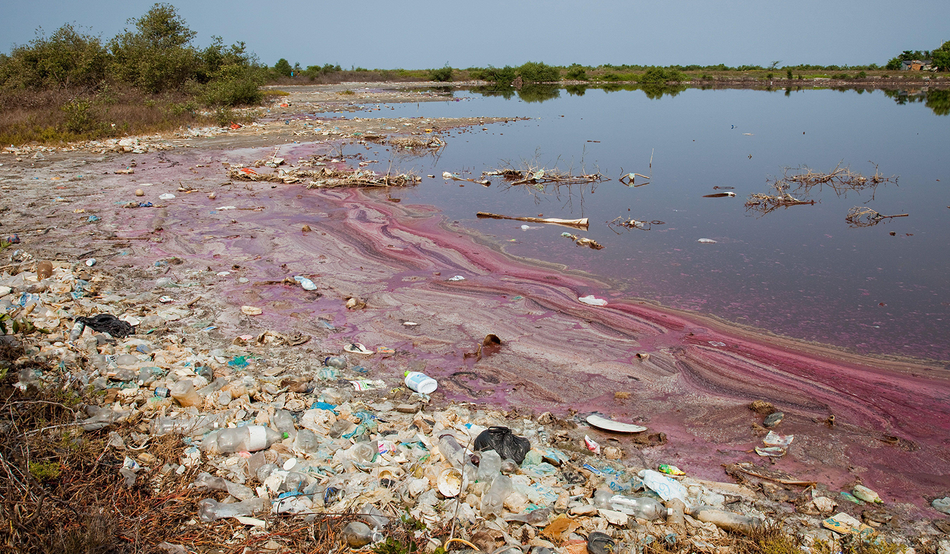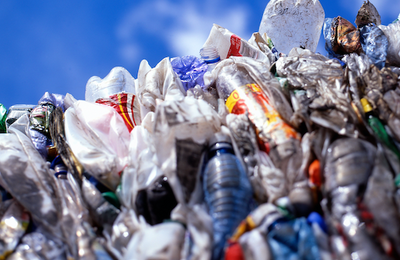I was on a beach when the latest global plastics treaty came and went in ignominy. At a remote spot on the South American Pacific coast, where all supplies and materials must come by small boat, and the locals make use of everything—I saw no waste or litter. And yet the beaches everywhere were littered with plastic. Just not local plastic. The world’s plastic, drawn in by a large system of rotating ocean currents from Asia and beyond. If anywhere shows how plastic waste is a global issue, it’s here.
Meanwhile in Geneva, delegates from 184 countries had gathered to try and reach a consensus about tackling this problem. Greeting delegates at the Intergovernmental Negotiating Committee, a Swiss ocean protection group handed out bars of soap in cardboard packaging that read “no dirty tricks, vote for a clean plastics treaty.” But before the bars were even out of their biodegradable packets, there were signs that these talks—like the countless sea animals caught by discarded ghost nets—were dead in the water.
On the eve of the talks, 5th August, Norway and Rwanda, the co-chairs of the High Ambition Coalition to End Plastic Pollution, released a LinkedIn statement that “reduced their ambition to a shockingly meek request that the negotiation mandate —the starting point for the process—be upheld,” says observer Magnus Løvold, of Lex International and the Norwegian Academy of International Law, previously with the International Committee of the Red Cross. “In one blow, [they] sold out each and every one of [their] core demands.” On 6th August, Reuters reported that the United States had sent letters to countries urging them to reject any global pact that limited plastic production and plastic chemical additives, leading Greenpeace to accuse the Trump administration of “old school bullying”.
When the five-round negotiations were launched in 2022, they were expected to tackle the explosive growth in plastic waste and touted as “The Paris Agreement of plastics”. Instead, as the New York Times describes, Geneva became “the latest example of the United Nations’ painstakingly slow and deadlock-prone negotiation-by-consensus… countries had not agreed on a single article”. Paul Newman of the Environmental Investigation Agency said on the What on Earth? podcast that, “a handful of Petro states and a small army of corporate lobbyists had effectively held the talks hostage” with the intention to “deliberately... scupper” them. That small army of oil, petrochemical and plastics lobbyists, by the way, numbered 234: more than the combined delegations of all 27 EU member states, and far more than the number of scientists and Indigenous peoples allowed to attend.
To be clear, plastic pollution isn’t just a bleeding-heart environmental threat. The Lancet journal calls plastic pollution a “grave, growing and underrecognized danger” to public health, costing the world at least $1.5 trillion annually. Microplastics, which form as larger plastic litter breaks down in the environment, have been detected throughout the human body, including the blood, lungs, liver and brain.
The average person eats, drinks and breathes between 78,000 and 211,000 microplastic particles every year. A US study found microplastics in 98.9 per cent of seafood samples. But it is an on-land problem too: microplastics are spread onto farmland through sewage sludge used as fertiliser, and blown in tumbleweeds of litter. Microplastics have been found everywhere from the top of Everest to the bottom of the Mariana Tench. As all this bioaccumulates, it can increase our likelihood of heart attack, stroke and death. So forgive us, petrostates and corporate lobbyists, if we take this rather personally.
Proposals made by Rwanda and Peru at the fourth round of plastic treaty negotiations called for a global target to reduce plastic production by 40 per cent by 2040, known as 40x40. This was the “high ambition” to which over 100 countries signed up. But in the two most recent negotiations, petrostates including the United States, aggressively prevented discussions of both plastic production and a restriction on chemicals used in production. Such chemicals include phalates, “endocrine disruptors” which interfere with the normal functioning of the body’s hormones and are particularly dangerous to developing foetuses; but also particularly useful for making flexible and stretchy plastics.
Deborah Barasa, the Kenyan negotiator, said despairingly at the time that the treaty had “lost its very objective… There are no global binding obligations on anything.” Fiji delegate Sivendra Michael added that the approach to plastic pollution was now simply “mopping the floor without turning off the tap.”
Petrostates and chemical lobbyists say that we just need to recycle more. Yet a 2024 report from the Center for Climate Integrity titled The Fraud of Plastic Recycling found that plastic producers have long known it’s very difficult to recycle plastic, but instead “engaged in fraudulent marketing and public education campaigns designed to mislead the public about the viability of plastic recycling as a solution to plastic waste”. Only about 9 per cent of plastics globally get recycled. The other 91 per cent ends up in landfills, as litter, or is incinerated. In the US, just 5 per cent of plastic waste is properly recycled. The UK exported nearly 600,000 tonnes of its plastic waste in 2023.
Plastics may be in fact, the last growth market for global oil demand, worth $700bn a year. The future of the petrochemicals industry holds “the hope of the oil industry”, say the Financial Times, as electrification eats into their traditional transport fuel dominance. Energy expert Chris Goodall informs in his 2024 book Possible that BP predicts over 50 per cent of crude oil extracted in 2050 will make plastics, not fuel: “The world is surprisingly blind to the greenhouse gas implications of the continuing growth in the non-energy uses of fossil fuels, of which plastics is the single most important component.”
The world produced over 460m metric tonnes of plastics in 2019—almost double what it produced 25 years ago. Some 52m metric tonnes also enter the environment as pollution every year; enough to fill New York’s Central Park with plastic waste as high as the Empire State Building.
By the 2040s, we are expected to produce 920m metric tonnes each year, and by 2060, 1.7bn. If the pollution rate remains the same, that would see 104m tonnes of plastic pollution annually by 2040 and 192m tonnes by 2060. The world cannot possibly absorb such levels of pollution without severe consequences; but petrochemical companies would have positive financial growth projections.
At the final plenary session of the plastics treaty in Geneva, the chair, Ecuador’s Luis Vayas Valdivieso, adjourned the meeting with a pledge to reconvene at a later, undetermined date. France’s ecology minister, Agnès Pannier-Runacher, told the closing session she was “enraged” that the meeting produced “no tangible results”. While the civil society group GAIA derided “a chaotic and biased process that left even the most engaged countries struggling to be heard... This is not the spirit of multilateralism—it was coercion.” No doubt a lot of soap bars that read “no dirty tricks, vote for a clean plastics treaty” were kept as ironic souvenirs.














